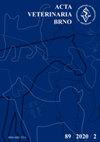尿液样本温度对经过特殊训练的狗嗅觉检测男性前列腺癌效果的影响
IF 0.7
4区 农林科学
Q3 VETERINARY SCIENCES
引用次数: 0
摘要
这项研究的目的是确定前列腺癌患者尿液样本的温度或未患前列腺癌的男性尿液样本的温度是否会影响经过特殊训练的狗利用其嗅觉能力检测前列腺癌的效果。共有218份尿液样本被分为两组,温度不同,通过狗嗅尿液样本来检测男性前列腺癌。在第1组(尿温15-23°C),用嗅探犬检测120份尿样,其中57份尿样呈阳性(来自确诊前列腺癌的男性),63份尿样呈阴性(来自未患前列腺癌的男性)。在第2组(尿温2 - 14°C),用嗅探犬检测了98份尿液样本,其中51份阳性(来自已确诊前列腺癌的男性),47份阴性(来自未患前列腺癌的男性)。我们的研究结果表明,一只经过特殊训练的狗利用尿液样本的嗅觉能力检测男性前列腺癌的效果与2-23°C的温度范围之间没有联系(P > 0.05)。本文章由计算机程序翻译,如有差异,请以英文原文为准。
The effect of urine sample temperature on the efficacy of olfactory detection of prostate cancer in men by a specially trained dog
The objective of the study was to determine whether the temperature of urine samples from patients with prostate cancer or the temperature of urine samples from men not suffering from this condition affects the efficacy of prostate cancer detection performed by a specially trained dog using its olfactory abilities. A total of 218 urine samples, divided into two sets differing in temperature, were tested for male prostate cancer by a dog sniffing urine samples. In group 1 (urine temperature 15–23 °C), 120 urine samples were examined by a sniffer dog, of which 57 samples were positive (from the group of men with established prostate cancer) and 63 samples were negative (from men not affected by prostate cancer). In group 2 (urine temperature 2–14 °C), 98 urine samples were examined by a sniffer dog, of which 51 were positive (from the group of men with established prostate cancer) and 47 were negative (from men not affected by prostate cancer). The results of our study demonstrated no link between the efficacy of male prostate cancer detection performed by a specially trained dog using its olfactory abilities from a urine sample and the temperature range from 2–23 °C (P > 0.05).
求助全文
通过发布文献求助,成功后即可免费获取论文全文。
去求助
来源期刊

Acta Veterinaria Brno
农林科学-兽医学
CiteScore
1.00
自引率
33.30%
发文量
36
审稿时长
18-36 weeks
期刊介绍:
ACTA VETERINARIA BRNO is a scientific journal of the University of Veterinary and Pharmaceutical Sciences in Brno, Czech Republic.
The scientific journal Acta Veterinaria Brno is dedicated to the publication of original research findings and clinical observations in veterinary and biomedical sciences. Original scientific research articles reporting new and substantial contribution to veterinary science and original methods that have not been submitted for publication elsewhere are considered for publication. A written statement to this effect should accompany the manuscript, along with approval for publication by the author´s head of department. The authors bear full responsibility for the contents of their contribution. Book reviews are published, too.
 求助内容:
求助内容: 应助结果提醒方式:
应助结果提醒方式:


